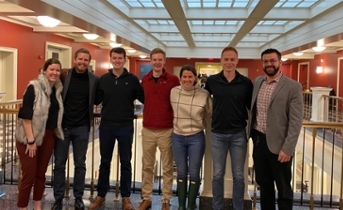
Miami students working with lab playing key role in COVID-19 fight
By Margo Kissell, university news and communications
A team of Miami University undergraduate students has been working with Gravity Diagnostics, a laboratory that is playing a key role in the fight against COVID-19.
The students’ work is part of a senior capstone course on enterprise consulting through the entrepreneurship program. Students learn to integrate and apply their business knowledge to real-world settings and test their strategic, analytic and problem-solving skills.
Gravity Diagnostics employees stand with Miami students at the Farmer School of Business on Jan. 31. From left, Gravity's Allison Wimmers and Ted Knauf, students Andrew Pfeil, Ryan Sarver (center), Molly Zilch, Kyle Fischer and Gravity's James Canner (submitted photo).
For Ryan Sarver, a senior marketing major, it has been an eye-opening experience working with the Covington, Kentucky-based lab.
“Adapting to this time of COVID-19 has been a challenge in all aspects of our lives. However, it has been extremely interesting and in many ways encouraging to get to work with such a dynamic company on the front lines of combating this virus and saving lives,” he said.
Kentucky’s governor announced recently the state is partnering with Kroger to increase COVID-19 drive-thru testing. Kentucky is contracting with Gravity Diagnostics to provide a 48-hour turnaround on the test results.
The students’ consulting work continues through the end of the semester. It began in late January when they met with the Gravity Diagnostics leadership team, including Tony Remington, CEO; Allison Wimmers, chief of staff; James Canner, vice president of regulatory, clinical and research programs; and Ted Knauf, director of business operations.
“At that time, the Gravity student team reviewed the company, its vision/mission, history and presented the consulting challenge,” said Tom Heuer, the Richard Forsythe Professor in Entrepreneurship and an assistant clinical lecturer in the Farmer School of Business. The students delivered their midterm presentation in mid-March.
Knauf provided positive feedback on the presentation to Heuer.
“This group is incredibly professional and have produced quality content for Gravity. They definitely get an A+ from me,” Knauf wrote. “Even if the project ended today, your students have demonstrated an immense capacity for understanding how a business can succeed by building an understanding of the market, stakeholders, etc. — no doubt this will serve them well in any entrepreneurial endeavors they pursue."
Heuer said the experience has taught the students how to work with companies and their leaders during difficult, disruptive times and understand how to offer insightful potential solutions to address extremely challenging situations.
Past clients of the enterprise consulting capstone include Procter & Gamble, The E.W. Scripps Company, Kroger, Fifth Third Bank, Paycor, 84.51° and Luxottica.
Sarver’s team worked closely with Gravity Diagnostics throughout this semester to assist them with some of their strategic growth goals. He said the lab already had a very strong focus on saving lives and helping people who struggle with the opioid crisis.
Molly Zilch, a senior entrepreneurship major with a co-major in interactive media studies, said her team has done a full audit and analysis of the Gravity Diagnostics brand and how they market themselves to clinicians, patients and payers.
“We have helped them define their Unique Value Proposition so they can show people how special their testing really is,” she said. “We have learned that it is more than just a test, it is about that individual person who they are helping whether it be drug addiction or they are severely sick.”
Zilch said their project definitely took a turn once COVID-19 hit halfway through the semester. It made them realize Gravity Diagnostics’ increasingly important role, which she said made them want to help even more.
“It is really cool to see … they can compete with the bigger labs,” she said.
